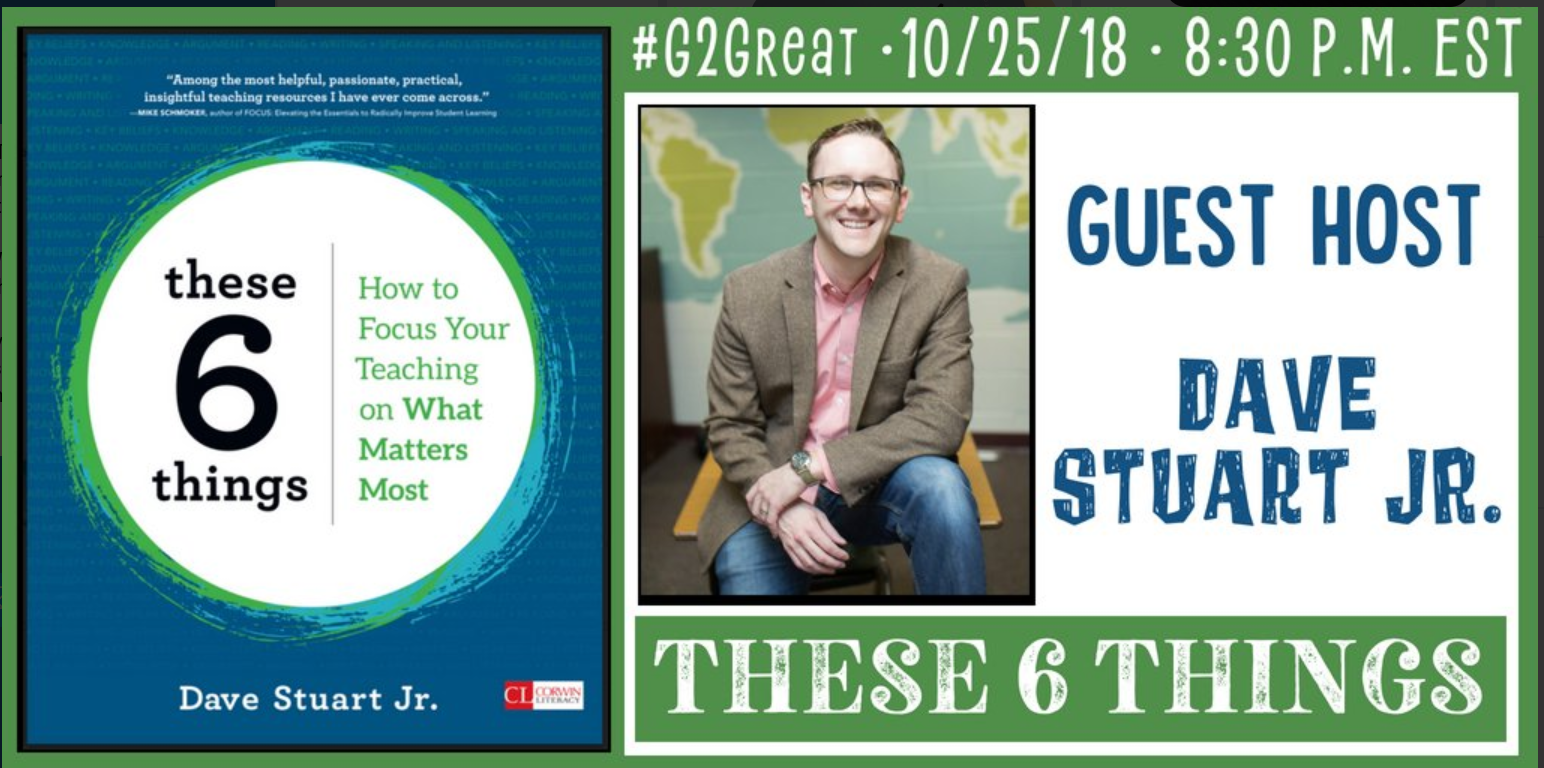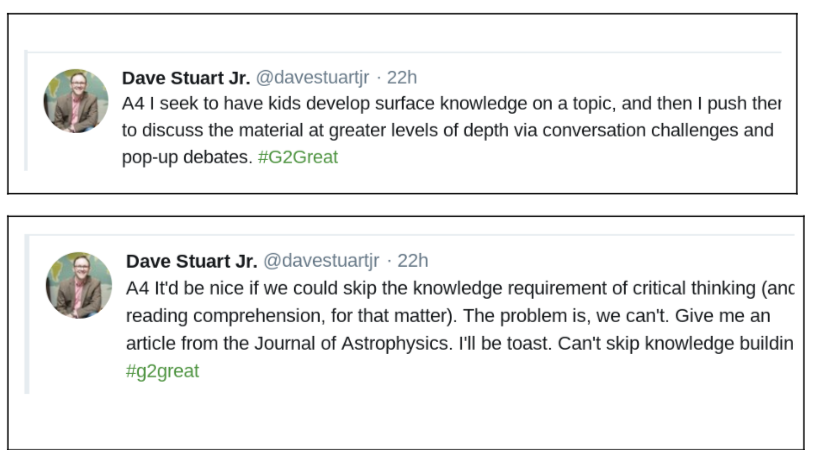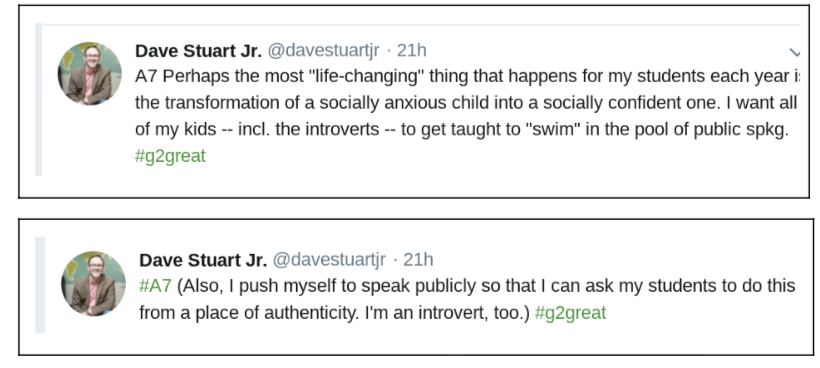“Focus?”
My eyes were devouring the text. Everything about the author. Everything. It’s been my pleasure to know Dave Stuart professionally, online as a blogger and in person, for several years. He is a teacher, author, speaker and thought-leader. Dave’s work impacted my practices and thinking as an educator when he encouraged teachers (and me) to “not freak out” over the Common Core. Many authors have written books about focus. A search for “focus” at Corwin Press had 827 results. A search of Amazon Books for “focus” resulted in 101 pages with a range of 18-19 entries per page. Focus has been a pretty popular topic.
So what’s different? “Focus on What Matters Most” is the conundrum. Who decides what matters the most? Each teacher? Each grade level? Each building? Each department? Each district? Each state? Do you see the problem? Dave proposes that we “focus on what we already know” as we work “Smarter, not Harder” and he gives us “permission to simplify.” No fancy language. No slick new strategy. No magic silver bullet. We learn from and with a trusted colleague, as literally, Dave shares how to streamline literacy instruction while increasing student achievement.
There’s a no-nonsense attitude. A bit of a “git-r-done” response. Time spent, yes. Time wasted, no. And that was the core of the #G2Great chat with first-time guest, Dave Stuart, Jr. on Thursday, October 25, 2018, as folks gathered around the #G2Great hashtag to converse and share ways to focus teaching.
But let me give you one last piece of advice . . . this book will not solve all your problems. This book will not help you work eight hour days or less. If that’s what you are looking for, please stop reading now. Instead, this book will help you use a decision-making framework that focuses your values, your goals for your students, and some key content areas to work on improving. YES, improving. Growing your skills in a few key areas to maximize learning for students. A laser-like focus that will help your students grow into the life-long learners that you know they can be. Your reward will be in knowing that you have done the best that you can! Let’s get started!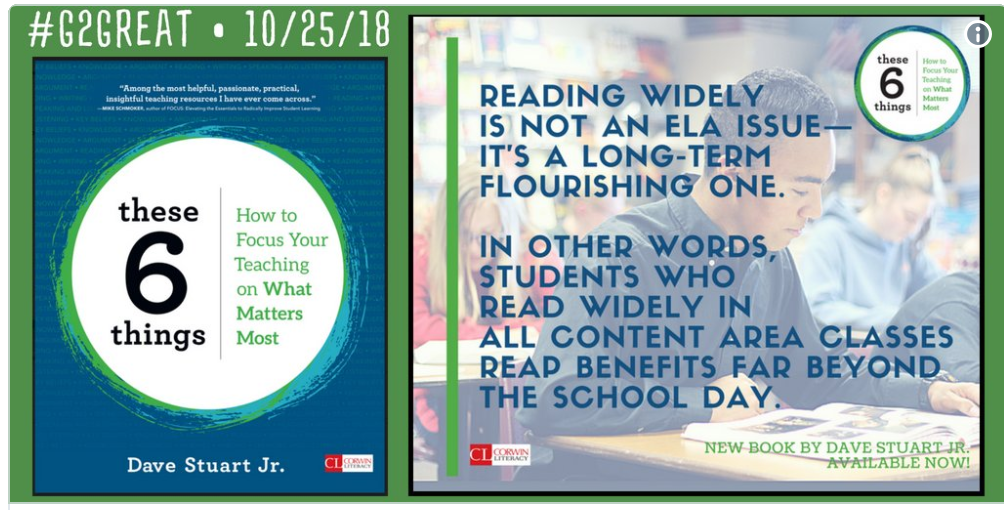 This was our opening quote. I’m going to invite you to take about 30 seconds now to pause and reflect. Pauses will be inserted at several points for some brief processing time. Pauses like speed bumps. Slow down, pause and think.
This was our opening quote. I’m going to invite you to take about 30 seconds now to pause and reflect. Pauses will be inserted at several points for some brief processing time. Pauses like speed bumps. Slow down, pause and think.
What are your thoughts about this opening quote?
What would it change for students in your district?
Mt. Everest
Dave argues that teachers need coherence of purpose, or an “Everest Statement” that encapsulates all that they hope to accomplish in a given year. What is the range of expectations for students? Academic? Life-long? Work-related? How broadly do folks think? During our chat, discussion of “Everest Statements” ranged from readers, writers, thinkers, talkers to building relationships with students and teachers and moving striving students to more successful behaviors and habits.
What is your “Everest Statement”?
Did you co-create it with your students?
Relationships with Students Matter
Students need to do the work of learning. In order to do quality work, students must see some value in that work in order to complete it with “care, attention, effort and focus.” Otherwise, the work remains undone or of such poor quality that it is difficult to ascertain if students are learning. Teachers don’t have to be master entertainers with cute gimmicks and gadgets for students to learn. Instead, students need to know that teachers care and that teachers are asking them to do relevant work.
How do you connect with students? 
How do the students know that you are credible?
Knowledge Required
Learning does not happen in a vacuum. So many facts can be googled but there is still a basic layer of knowledge that precedes talk about a topic. This aligns with Bloom’s Taxonomy and Webb’s Depth of Knowledge. The key is not staying in the low recall level very long. What’s the implication for focus? Reading, writing, speaking and listening have to move to higher levels routinely and often. Analysis and synthesis require students to participate and think. Classroom routines and procedures need to nurture and lift up the complexity of student responses.

How often are students moving beyond recall?
What structures do you have in place for discussion?
Argument
Being able to disagree with someone without being disagreeable is a learned skill that takes practice and involves both listening and speaking. An argument can be as simple as rehearsing two sides to a question to determine the next course of action or as involved and complicated as a formal debate. Arguments in content area classes can be about which examples best define a vocabulary term or which traits represent historical figures or about which tool has the best consumer product rating in an applied science course. Dave uses “pop-up debates” to practice arguments. This is another example of a way to begin with some basic knowledge through reading, writing, or other media and then build up to evidence of the use of critical thinking.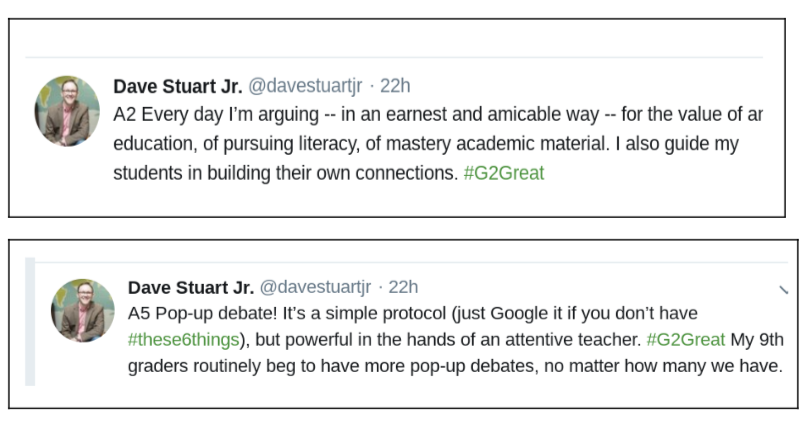
What role does argument play in your classroom?
How might you use oral practice (pop-up debates) to build student skills before writing?
Public Speaking
Public Speaking. One of the biggest fears of most adults. If the speaking and listening standards at your school still resemble the Common Core standards, then speech is no longer relegated to a one semester high school course. Speaking and listening are required of every grade level and every content area PK – 12. That’s not just wishful thinking. Speaking or discussing is an easy formative assessment. Speaking is a quick check for understanding after reading. It’s an important rehearsal skill. And it’s also complex because spoken responses also run the gamut of Bloom’s or DOK skills. There’s also a delicate balance between the level of comfort in sharing ideas and disagreements that is dependent on the level of respect, trust and community in the classroom.
What are my expectations of myself for public speaking?
What are the expectations for my students?
Does this apply to me?
An elementary teacher friend texted, “Should I check out the chat? Dave’s a high school teacher.” And of course, I said, “YES! You must!” I believe this is a book that will frame conversations so all teachers can figure out what matters most. It will be incredibly helpful for content area teachers in all secondary classrooms. But I also believe that it’s helpful from the winter holiday on for teachers in second grade and all teachers in grades 3-6 (or any teachers on a PK-12 vertical team) who have ever asked any of these questions:
“How do I focus when planning curricula?”
“How do I focus when planning instruction?”
“How do I focus when preparing school or building wide policies and procedures?”
“How do I focus when feeling stressed or defeated?”
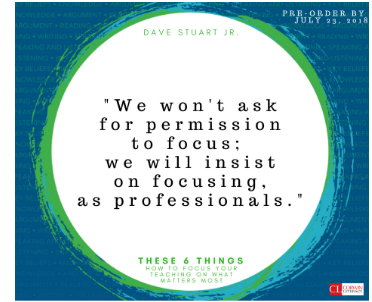
The role of focus in a teacher’s life is undeniable. Being as productive as possible during the teaching day frees up time for families and life outside of school. Time that is necessary to be the best teacher possible for every minute of the school day. Dave’s book won’t make all the decisions for you, but it will give you a framework for self-reflection and conversations with co-workers. That will put you on the path to a focus on WHAT REALLY MATTERS!

What actions will move you forward?
Where will you begin?
This post reflects some of the ideas from the #G2Great chat with a little background from the book. You will need to check out the book to get the full picture.
You can simplify your teaching, teach all the standards and have a life. Dave Stuart Jr and these 6 things will start you on that journey. Grab a couple friends, read the free first chapter online, and get the learning started!
Links for Additional Exploration:
Corwin Book
Dave’s Blog
Check out the #NCTE18 program for sessions with Dave Stuart Jr.
Dave Stuart Jr. book signing at NCTE Saturday, November 17, 2018 at 4:15 in the Corwin Booth!
